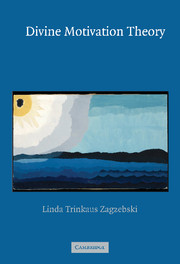Book contents
- Frontmatter
- Contents
- Preface
- Acknowledgments
- Part I Motivation-based virtue ethics
- Part II Divine Motivation theory
- 5 The virtues of God
- 6 The moral importance of the Incarnation
- 7 The paradoxes of perfect goodness
- 8 The problem of evil
- Conclusion to Part II
- Part III Ethical pluralism
- Bibliography
- Name index
- Subject index
6 - The moral importance of the Incarnation
Published online by Cambridge University Press: 02 December 2009
- Frontmatter
- Contents
- Preface
- Acknowledgments
- Part I Motivation-based virtue ethics
- Part II Divine Motivation theory
- 5 The virtues of God
- 6 The moral importance of the Incarnation
- 7 The paradoxes of perfect goodness
- 8 The problem of evil
- Conclusion to Part II
- Part III Ethical pluralism
- Bibliography
- Name index
- Subject index
Summary
In His immeasurable love He became what we are in order to make us what He is.
Saint Irenaeus, Against the HeresiesMUST CHRISTIANITY BE AN ETHIC OF LAW?
Christian theological ethics has usually been an ethic of law. It is worth considering why this is so. Is there something about Christian doctrine that requires it? Elizabeth Anscombe (1958) implies an affirmative answer in her classic paper, “Modern Moral Philosophy” (p. 30). There Anscombe argues not only that Christianity has a law ethic, but also that the favorite concept of modern British moral philosophers – obligation – makes no sense except within a law system of ethics. She goes on to argue that an ethics of law makes no sense without a divine lawgiver, so her conclusion is not only that Christian ethics is an ethics of law, but also that any philosopher who wants to retain the concept of obligation as developed within Western philosophy is logically committed to the existence of God (p. 31). Unsurprisingly, most contemporary philosophers have rejected her second claim. Here I want to reject her first.
The connection between Christianity and law-based ethics may be largely owing to historical contingencies that connected the development of Christianity with Roman law, but I wonder how deep the connection is in Christian doctrine. Since the alternative that I am proposing is a Christian virtue theory, it is startling to find Jerome Schneewind blaming Christianity's promotion of morality as law for the earliest and most important “misfortune” that virtue ethics encountered.
- Type
- Chapter
- Information
- Divine Motivation Theory , pp. 228 - 270Publisher: Cambridge University PressPrint publication year: 2004



